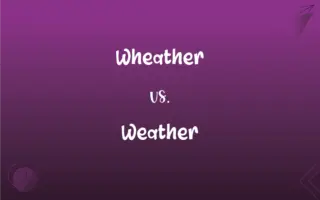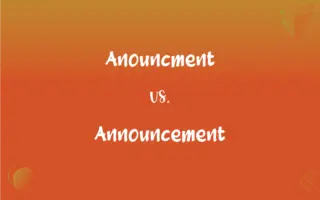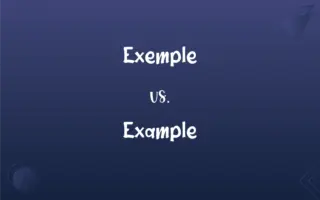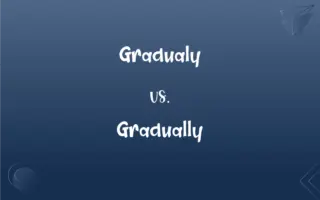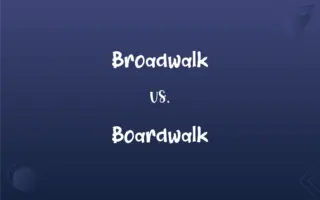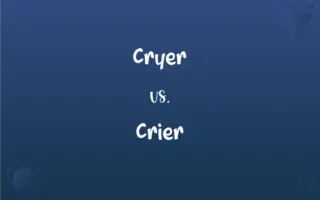Evidentally vs. Evidently: Mastering the Correct Spelling
Edited by Janet White || By Harlon Moss || Updated on March 9, 2024
"Evidentally" is an incorrect spelling, while "evidently" is correct. Evidently means clearly or obviously.
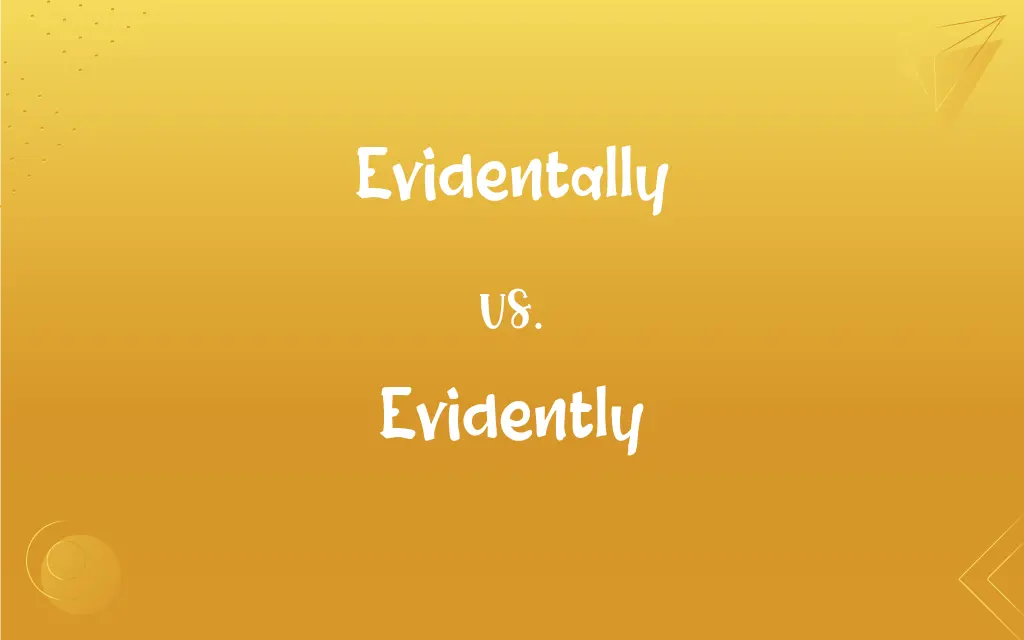
Which is correct: Evidentally or Evidently
How to spell Evidently?

Evidentally is Incorrect

Evidently is Correct
ADVERTISEMENT
Key Differences
Use a mnemonic: "Evident Language Yields" can be abbreviated as "E-L-Y," mirroring the end of "evidently."
Remember that "evidently" contains "evident," a common word, while "evidentally" adds an extra "al" which is unnecessary.
Associate "evidently" with "evidence," as both share the same root and spelling structure.
Note that "evidently" aligns with other adverbs ending in "-ly" like "clearly" and "directly," which don't have additional letters before "-ly."
Practice writing sentences with "evidently" and compare them to incorrect versions with "evidentally" to reinforce the correct spelling.
ADVERTISEMENT
Correct usage of Evidently
It was evidentally clear that he had no intention of apologizing.
It was evidently clear that he had no intention of apologizing.
Evidently, she has been working hard to improve her skills.
The solution to the problem was not evidentally to everyone in the room.
The solution to the problem was not evidently to everyone in the room.
Evidently, the project was a success because of the teamwork involved.
The changes made to the policy were evidentally beneficial to the company.
The changes made to the policy were evidently beneficial to the company.
Evidently Definitions
Without doubt; unmistakably.
The results were evidently favorable.
Clearly apparent or obvious to the mind.
Evidently, she was mistaken.
In a manner that leaves no room for doubt.
He was evidently the best choice for the role.
In a way that is easily perceived or understood.
The solution was evidently simple.
As far as one can tell.
She was evidently upset about the decision.
Obviously; clearly.
According to the evidence available
The stranger approached the microphone, evidently intending to speak.
In a manner which makes the fact or conclusion evident; obviously; as may be clearly inferred.
(obsolete) In such a way as to be clearly visible or manifest; distinctly, clearly.
(proscribed) apparently
In an evident manner; clearly; plainly.
Before whose eyes Jesus Christ hath been evidently set forth.
He was evidently in the prime of youth.
Unmistakably (`plain' is often used informally for `plainly');
The answer is obviously wrong
She was in bed and evidently in great pain
He was manifestly too important to leave off the guest list
It is all patently nonsense
She has apparently been living here for some time
I thought he owned the property, but apparently not
You are plainly wrong
He is plain stubborn
Evidently Sentences
He was evidently upset about the decision made in the meeting.
She had evidently forgotten to bring her notes to the lecture.
His improvement in the class was evidently the result of hard work.
The cake was evidently a hit at the party, judging by how little was left.
She had evidently made a big impression on them during her interview.
The sign was evidently too small to be seen from a distance.
Evidently, the book was more popular than the movie adaptation.
Evidently, the weather is going to change later today.
Evidently, they had been planning the surprise party for weeks.
Evidently, the rumor about the merger was true.
The team's strategy was evidently successful, given their victory.
The path was evidently designed to offer the best views of the landscape.
Their expertise in the field was evidently unmatched.
The historical significance of the site was evidently important to the community.
His knowledge on the topic was evidently vast.
Evidently, taking the back roads was a good idea to avoid traffic.
The decision to postpone the event was evidently the right one, considering the weather forecast.
She was evidently the best candidate for the position.
He had evidently underestimated the complexity of the task.
It was evidently a difficult choice, but she seemed confident in her decision.
The importance of practicing safety measures was evidently emphasized in the workshop.
The concert was evidently sold out, judging by the crowded venue.
Evidently, the new policy has made a significant difference in efficiency.
The project's success was evidently due to the collaboration between departments.
Her excitement about the trip was evidently contagious.
FAQs
Which vowel is used before evidently?
The vowel "e" is used before "vidently" in "evidently."
What is the root word of evidently?
The root word of "evidently" is "evident."
What is the verb form of evidently?
There is no verb form of "evidently"; it's an adverb. The related verb would be "evidentiate."
What is the pronunciation of evidently?
Evidently is pronounced as /ˈɛvɪdəntli/.
Which conjunction is used with evidently?
Any conjunction can be used with "evidently," depending on the sentence structure.
What is the singular form of evidently?
"Evidently" is an adverb and does not have a singular or plural form.
Is evidently an adverb?
Yes, "evidently" is an adverb.
Is evidently a negative or positive word?
"Evidently" is neutral; it's neither inherently negative nor positive.
Why is it called evidently?
It's called "evidently" because it denotes something clear or obvious, often based on evidence.
What is the plural form of evidently?
As an adverb, "evidently" does not have a plural form.
Which article is used with evidently?
As an adverb, "evidently" does not typically require an article.
Is evidently an abstract noun?
No, "evidently" is not a noun; it's an adverb.
Is evidently a collective noun?
No, "evidently" is an adverb, not a collective noun.
Which determiner is used with evidently?
Determiners are not typically used with adverbs like "evidently."
How is evidently used in a sentence?
Example: "She was evidently displeased with the decision."
Is evidently a noun or adjective?
"Evidently" is neither a noun nor an adjective; it's an adverb.
How do we divide evidently into syllables?
Evidently is divided as: ev-i-dent-ly.
What is a stressed syllable in evidently?
The first syllable "ev" is stressed in "evidently."
What is another term for evidently?
Another term for "evidently" is "clearly."
What is the opposite of evidently?
The opposite of "evidently" could be "obscurely" or "uncertainly."
What is the first form of evidently?
"Evidently" doesn't have forms like a verb; it's always "evidently."
What is the third form of evidently?
As an adverb, "evidently" does not have a third form.
Which preposition is used with evidently?
No specific preposition is routinely used with "evidently"; it depends on the sentence context.
Is evidently a vowel or consonant?
"Evidently" is a word, not a vowel or consonant.
What part of speech is evidently?
"Evidently" is an adverb.
Is evidently a countable noun?
"Evidently" is not a noun; it's an adverb and thus not countable.
Is the evidently term a metaphor?
"Evidently" is not a metaphor; it's an adverb used to indicate clarity or obviousness.
Is the word evidently is imperative?
"Evidently" is not imperative; it's an adverb describing the manner of an action.
How many syllables are in evidently?
There are four syllables in "evidently."
What is the second form of evidently?
"Evidently" does not have different forms as it's an adverb.
About Author
Written by
Harlon MossHarlon is a seasoned quality moderator and accomplished content writer for Difference Wiki. An alumnus of the prestigious University of California, he earned his degree in Computer Science. Leveraging his academic background, Harlon brings a meticulous and informed perspective to his work, ensuring content accuracy and excellence.
Edited by
Janet WhiteJanet White has been an esteemed writer and blogger for Difference Wiki. Holding a Master's degree in Science and Medical Journalism from the prestigious Boston University, she has consistently demonstrated her expertise and passion for her field. When she's not immersed in her work, Janet relishes her time exercising, delving into a good book, and cherishing moments with friends and family.
